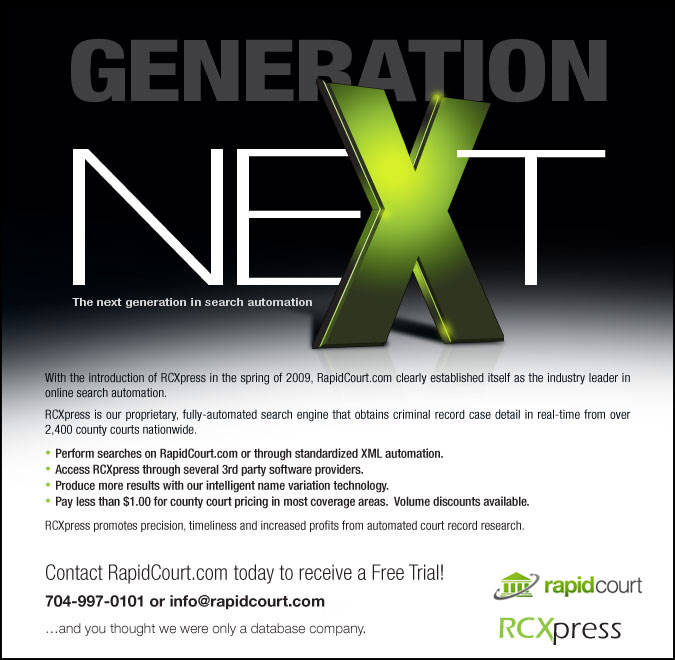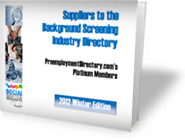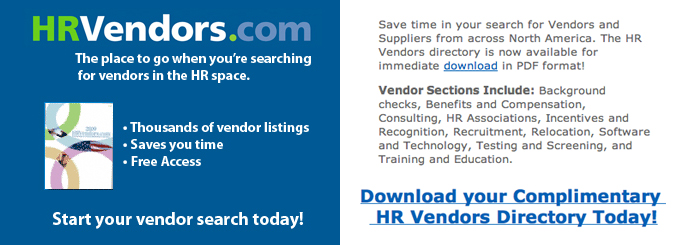| BACKGROUND
SCREENING NEWS |
U.S.
Consumer Watchdog to Oversee Credit Bureaus
The Consumer Financial Protection Bureau (CFPB) announced
that it will soon begin supervising the leading credit bureaus,
the companies that collect financial details of everyone's life.
Until now, credit-reporting companies have lacked a single federal
overseer. Credit reports have increasing importance in consumers'
lives because they are used in many kinds of lending, by landlords
in renting a property and even as a way to screen job applicants.
Additionally, various reports have found that up to 25% of credit
reports contain errors that could hurt consumers' ability to
borrow. CFPB Director, Richard Cordray said areas of concern
for the CFPB include: the information sent to credit bureaus,
the ways they assemble and hold information, and "how difficult
it is to get the errors resolved" when consumers identify them.
The supervision of credit reporting agencies will start Sept.
30, and the bureau will begin on-site examinations after that.
To read
more,
click here

SHRM
Survey Findings: Background Checking-The Use of Criminal Background
Checks in Hiring Decisions
- Sixty-nine
percent of organizations reported that they conduct criminal
background checks on all of their job candidates. Eighteen
percent of organizations conduct criminal checks on select
job candidates, and 14% do not conduct criminal checks on
any job candidates.
- Among
organizations that conduct criminal background checks, most
initiate criminal background checks after a contingent job
offer (62%) or after the job interview (32%). Very few organizations
(4%) initiate criminal background checks before a job interview.
- Organizations
conduct criminal checks on job candidates 1) to reduce legal
liability for negligent hiring (52%) and 2) to ensure a safe
work environment for employees (49%).
- The
top two criminal activities that are very influential in the
decision not to hire a job candidate are a convicted violent
felony (96%) and a convicted nonviolent felony (74%).
To see
more about survey results
click here

Background
Check Error Leaves Worker "Humiliated"
Modern technology makes it possible to instantly search
billions of public records stored all over the world, which
has spawned an entire industry dedicated to screening job applicants
for employers. However, when they make a mistake, the consequences
can be devastating. Attorney Jeff Hynes says he has seen a steep
rise in complaints about mistakes in criminal background checks.
"It's not only a growing problem, but it is a gross injustice,"
said Hynes. A common misconception about criminal background
checks is that personal identifying information such
as a social
security number is being used to find information on an individual.
Yet, most employers don't even provide background screening
companies with the race or sex of an applicant. Instead they
rely on name and date of birth alone, which increases the chance
of error. When an error takes place, it's the applicant who's
left with the burden of proving he or she is not a criminal.
Hynes encourages job applicants to do their own criminal background
check in advance and suggests telling a potential employer upfront
about any potential problems.
To read more, click
here

State
Destroying Online Court Records, Raising Debate Over Privacy,
Consistency
Pennsylvania has removed millions of public records
from a state court system website. State officials say they
are treating the electronic copies like paper ones, which are
destroyed after a certain period of time. Records of serious
crimes are still kept for decades. Edward Spreha, a Harrisburg-based
defense attorney, said the change would make it harder to find
criminal and civil court records; searches that once took moments
could potentially take weeks. Steve Schell, a spokesman for
the Administrative Office of Pennsylvania Courts (AOPC), said
the core issues are consistency and privacy. Schell also said
the paper record in such cases is the official copy and removing
the electronic copies after paper originals have been destroyed
is consistent with state Supreme Court guidelines. The new policy
will not affect the results of criminal background checks, which
are conducted by State Police. Common Pleas or appellate courts
records will be kept indefinitely.
"As a public
access advocate, you can't change history," said Melissa Melewsky,
a lawyer for the Pennsylvania Newspaper Association. "This is
a step in the opposite direction, because we're getting less
access."
To read
more,
click here

To
'Minimize Risk,' Penn State Expands Background Check Policy
Following the conviction of former assistant football coach
Jerry Sandusky on child sexual abuse charges, Penn State University
has announced a plan to expand criminal background check requirements
for all new and some current employees. The new policy, which
reflects best practices, is meant to ensure that the criminal
histories and potential sexual abuse records of future employees
will be thoroughly reviewed before hiring. The new policy requires
background checks for all current employees considered to be
in "sensitive/critical" positions, which include those with
responsibility for protecting personal data, those with master
key access to all buildings and those with responsibility for
controlled substances or hazardous materials. This move follows
a June announcement by Penn State of a new sexual abuse reporting
policy that requires all university employees to complete annual
reporter training, and calls for disciplinary action, up to
and including dismissal, to be taken against any employee that
willfully fails to report a suspected case of child abuse.
To read more,
click here



The
Berg Report
By
Bruce Berg
With more
than 650 exhibiting companies, the SHRM eXpo is the largest
trade show dedicated to human resource management products and
services. The paid attendance was reported by SHRM as 15,800
plus the 4200 personnel with the 702 exhibitors or a total of
20,000. There were 45+ exhibitors selling background screening
and 31 of those limited their business primarily to background
screens.
The mood was very upbeat with everyone extremely pleased with
the quantity and the quality of traffic to their booths. So,
not only did they see a lot of people on the exhibit floor but
a healthy portion of those they talked with were either decision
makers or doing research on behalf of the decision maker at
their employer Companies are spending the money to be proactive
regarding HR and they are seeking better solutions to their
background checking challenges.
Although, NAPBS was not an exhibitor this year, I sure saw those
NAPBS member signs in the booths of the background screeners!
They consider this an important marketing tool.
Two key points:
- The
issue of HR being dissatisfied with their current CRA was
a common theme as it has been over the last 17 years I have
been doing the SHRM conference. CEO, COO or Chief Sales Officer
should be asking "Why are so many HR people unhappy with their
current vendor?" Better yet, ask your existing customers.
- People
were not shopping price, they were shopping service and turnaround
time.
Everyone
I talked to said their sales are up, and up very nicely from
last year. Several are claiming increases of over 35%. Looks
like 2012 and 2013 will continue to be great years for our industry.
To read
the full report click
here

U.S.
To Participate in APEC's Cross Border Privacy Rules System
Acting
U.S. Commerce Secretary Rebecca Blank today announced the
United States' participation in the Asia-Pacific Economic
Cooperation's (APEC) Cross Border Privacy Rules (CBPR) system.
This voluntary system promotes a baseline set of data privacy
practices for companies doing business in participating APEC
economies. The goal of the system is to enhance electronic
commerce, facilitate trade and economic growth, and strengthen
consumer privacy protections across the Asia Pacific region.
"U.S.
participation in APEC's Cross Border Privacy Rules system
is a significant milestone in international data protection
and is an important step in the implementation of the global
privacy strategy outlined in the Obama administration's February
2012 Data Privacy Blueprint," said Acting Secretary Rebecca
Blank. "This system will enable participating companies in
the United States and other APEC member economies to more
efficiently exchange data in a secure manner and will enhance
consumer data privacy by establishing a consistent level of
protection and accountability in the APEC region.
To read
more click here

LIARS
INDEX® RETREATS IN FIRST HALF OF 2012
Brookfield, WI -
The Liars Index®, which tracks false education claims on
resumes, was at an all time high in the back half of 2011, reaching
a record 27.27%. For the first half of 2012, the degree of degree
lying moderated to 20.69%, but the moving average of the prior
two years held relatively steady, at 21.62%, vs. the 21.80%
level of six months ago.

Reprinted
with permission of Jude Werra, Jude M. Werra & Associates,
Brookfield, WI
To read
the full report click
here
FTC
Action Against Wyndham May Provide First Fully Litigated Section
5 Privacy/Security Case
The FTC
has filed a complaint against Wyndham Worldwide Corporation,
a global hotel and resort company, and three of its subsidiaries
for violation of Section 5 of the FTC Act. If this case goes
to trial, it will be the first privacy/security matter fully
litigated under Section 5. The Commission brought the case in
the U.S. District Court for the District of Arizona alleging
"failure to maintain reasonable and appropriate data security
for consumers' sensitive personal data" after Wyndham faced
three data breaches in less than two years. The FTC claims this
resulted in over $10.6 million in fraud loss. According to the
complaint, Wyndham's inadequate security procedures enabled
intruders to install "memory-scraping" malware to access payment
card data, and to access files, leading to the compromise of
more than 500,000 payment card accounts. The FTC claims Wyndham
knew its vulnerabilities, particularly after the first breach,
and yet made way for the subsequent breaches by failing to remedy
those vulnerabilities.
To read more, click here

Vermont
Joins Growing Number of States Restricting Use of Credit Checks
for Employment Purposes
Effective
July 1, 2012, Vermont joins California, Connecticut, Hawaii,
Illinois, Maryland, Oregon, and Washington as jurisdictions
that restrict an employer's right to obtain and use credit information
for making employment decisions. Under the new law, Vermont
employer are restricted in their ability to inquire about or
use an applicant's or employee's credit report or credit history
with respect to employment, compensation, or a term, condition,
or privilege of employment.
To read
more click
here

| Welcome
to the U.S. Legal Challenge Question! |
Sponsored By:


As the background screening
industry continues to get more competitive the firms that will
ultimately succeed will be those that create competitive advantage
through their people by offering continuous learning opportunities
to heightened their knowledge and capabilities. We believe that
having employees that are very knowledgeable about the legal landscape
of background screening is essential to continued success.
We are grateful
to Pam Devata, Seyfarth Shaw
LLP for providing the expertise for this valuable endeavor.
For information regarding the answers to the Legal Challenge Questions,
please contact Pamela Devata at Seyfarth Shaw LLP at pdevata@seyfarth.com
or 312-460-5000 or visit www.seyfarth.com.
Please choose your
answer by clicking on it:

Illinois
and Federal Legislation to Restrict Employer Access to Social
Networking Log-in Credentials
It was recently
announced that Governor Quinn will sign legislation that will
amend Illinois' Right to Privacy in the Workplace Act, 820 ILCS
55/1 et seq. (the Act), to prohibit employers from requesting
or requiring employees and applicants for employment to disclose
their log-in credentials for or to grant access to their social
media accounts. Once the legislation has been signed, Illinois
will be the second state in the country (after Maryland) to prohibit
employers from requesting or requiring social networking log-in
credentials from applicants and employees.
The legislation
will amend Section 55/10 of the Act, entitled "Prohibited Inquiries."
To read more
click here

New
Legislation Restricting Criminal History Information Reported
In Background Checks
Starting
July 1, 2012, Indiana
House Bill 1033, will, in part: (1) prohibit certain pre-employment
inquiries; (2)
restrict the types of criminal history information that employers
and background report providers (known as "consumer reporting
agencies" or CRAs) can obtain from Indiana state court clerks;
and (3) restrict the types of criminal history information that
CRAs can report to employers in background reports.
The law provides
that, effective July 1, 2012, residents of Indiana with restricted
or sealed criminal records may legally state on an "application
for employment or any other document" that they have not been
adjudicated, arrested or convicted of the offense recorded in
the restricted records.
Also effective
July 1, 2012, the law will restrict information that individuals
and businesses such as employers
and CRAs can obtain from Indiana state court clerks.
Effective
July 1, 2013, the law also will restrict information that "criminal
history providers" can report to others.
To read more
click here


Employer
Not Required To Conduct Background Check, and Not Liable To Customer
Who Was Pistol-Whipped by Employee
In Harris
v. KFC U.S. Properties, Inc., a federal district court in
Pennsylvania ruled that the operator of a Kentucky Fried Chicken
outlet in Philadelphia was not liable to a customer who was pistol-whipped
by a store clerk. In the lawsuit filed Harris claimed that KFC
was negligent in not conducting a background check, and should
have known that the assailant had a propensity for violence. KFC
had a policy prohibiting employees from bringing guns or other
weapons to the workplace.
KFC only
conducted criminal history checks of candidates for management
positions. Rejecting Harris' claim, the court held that KFC was
not legally required to conduct a criminal history check for store
clerks. Further, if KFC had conducted a background check, the
records would have revealed that employee had two prior convictions
for nonviolent crimes from over five years ago. Under such circumstances,
KFC was not legally on notice that the employee would bring a
gun to work and pistol-whip a customer.
Source: Victor
Schachter and Allen Kato, Fenwick
& West LLP
To read more
click here

Don't
Screen Out State Laws When Hiring
A recent
decision from the Northern District of Illinois serves as a reminder
to employers to consider both federal and state laws regarding
pre-employment screening when making hiring decisions. In Stratton
v. Merrill Lynch, 2012 U.S. Dist. LEXIS 60426, 2012 WL 1533456
(N.D. Ill. Apr. 25, 2012), the court determined that the Federal
Deposit Insurance Act (FDIA) did not preempt the Illinois Human
Rights Act, 775 ILCS 5/2-103, which prohibits employers from using
the fact of an arrest as a basis for taking an adverse
employment action. The FDIA § 1829 prohibits any individual
who has been convicted of any crime involving dishonesty,
breach of trust, or money laundering from institutional affiliation
with any insured depository institution.
Stating that
"[n]othing in § 1829 demonstrates a Congressional intent
to completely preempt state civil rights employment laws," the
Court remanded the case to state court.
In light
of this decision, employers are encouraged to ensure their policies
comply with all applicable laws concerning pre-employment screening.
Federal laws will not always prevent the application of state
laws, which may contain different restrictions on information
permissible to use in making employment decisions.
Source:
http://www.natlawreview.com/article/don-t-screen-out-state-laws-when-hiring

New Ohio Law Should Make it Easier for Criminal Convicts to Obtain
Employment
A lengthy and complicated new law enacted by the Ohio
legislature includes provisions that will make it easier for individuals
with conviction histories to obtain employment and occupational
licenses. Senate Bill 337 amends several Ohio statutes relating
to collateral sanctions for criminal offenses by creating certificates
of qualification for employment, reducing licensing restrictions
for certain fields and expanding courts' authority to seal criminal
records. A collateral sanction is a penalty, disability, or disadvantage
that is related to employment or occupational licensing as a result
of the individual's conviction of, or plea of guilty to, an offense.
Presumably, the relaxing of standards for sealing criminal records
will render background checks for criminal convictions less reliable.
The new law enables an individual who is subject to a collateral
sanction to obtain a certificate of qualification for employment
that will provide relief from certain bars on employment. The
law also provides that an employer that knew of the certificate
at the time of hiring will have immunity from liability as to
a claim brought against it alleging harm due to the individual's
alleged negligent hiring.
To read more, click here

PA Bill Will Protect Privacy of Employee Social Media
Passwords
On June 18, 2012, the Pennsylvania House of Representatives introduced
the Social Media Privacy Protection Act, which would protect the
privacy of employee online user names and passwords. The bill
provides that an "employer may not request or require that an
employee or prospective employee disclose any user name, password
or other means for accessing a private or personal social media
account, service or Internet website." Employers may not discipline,
penalize, or threaten an employee for refusing to provide this
information, nor can they refuse to hire any prospective employee
as a result of the prospective employee's refusal to disclose
this information. Those who violate these rules face a civil penalty
of up to $5,000 in addition to reimbursement for reasonable attorney
fees.
To read more, click here

LawLogix
Selected as One of the Most Successful Hispanic-Owned Companies
in the U.S. For 2nd Consecutive Year
LawLogix
Group, Inc., the leader in I-9 Compliance, E-Verify and Immigration
Case Management Software, announced today that it was recognized
by Hispanic Business Magazine as one of the 500 most successful
Hispanic-owned businesses in the U.S. LawLogix was ranked 364th
among all Hispanic-owned businesses in the U.S. and third among
Hispanic-owned businesses in Phoenix, Arizona. The HispanicBusiness
500® selected the largest Hispanic-owned companies in the
country based on a third-party audit of 2011 annual revenue.
"We are delighted
to be selected for The Hispanic Business 500 for the second consecutive
year," said Dan Siciliano, Co-Founder of LawLogix and Director
of Stanford University's Rock Center for Corporate Governance.
"As our advancement up the list shows, clients continue to choose
our company over the competition because of our intuitive, easy
to use software and hands on customer support approach.
To read more
click here

eScreen Ranks 27 on Ingram's List of Kansas City Area
2012 Fastest Growing Companies
eScreen,
Inc., a leading provider of workplace drug-screening solutions
and technology, today announced it was named number 27 among the
2012 Corporate Report 100 winners and is
featured
with other Kansas City area fast-growing companies in Ingram's
July 2012 All-Star special edition.
The annual
Ingram's Corporate Report 100 recognizes Kansas City-metro's
100 fastest-growing companies. Organizations with at least $1
million in revenue in 2011 are ranked by revenue growth between
2008 and 2011 to comprise the "Corporate Report 100." eScreen
ranked third amongst all the Kansas City companies in the over
$100 million category.
To read more
click here
According
to the National Council on Compensation Insurance, as much as
38 to 50 percent of all workers' compensation claims are related
to substance abuse.

Public
Record Update
Sponsored by:

Public
Record Update
By Mike Sankey, PRRN
|
Fee to Purchase Kentucky Criminal Record to
Increase Soon |
|
|
|
The fee for a criminal record search in Kentucky
will increase from $15.00 to $20.00 effective
July 1, 2012. The fee increase is part of a plan
to stay within the court system's budget, which
received deep cuts with the passage of House Bill
269 (see www.lrc.ky.gov/record/12RS/HB269.htm
).
About
Criminal Record Searches: Very few Circuit
or District courts will perform a name search
for the public. Most courts send criminal record
requesters to a statewide service provided by
the Administrative Office of the Courts. Records
may be requested via fax, standard mail, walk-in,
online, and even a drive-thru service. The CourtNet
Criminal History database contains records from
all 120 counties for at least the last five years
for all misdemeanor and traffic cases and for
felonies dating back to 1978. The criminal record
online ordering system is called AOCFastCheck.
For details on ordered and how to set-up an account,
visit http://courts.ky.gov/aoc/AOCFastCheck.htm
.
Note as part of this plan that courthouses
will be closed statewide on August 6, September
4, and October 15, 2012; employees will
be furloughed. Also, since 2008 the Judicial Branch
has cut 282 employees statewide and eliminated
court programs in an effort to stay within their
budget.
| Vermont
Increasing Fee for Manual Driving Records
|
Effective July 1, 2012, the fee for a copy of
a Vermont three-year driver operating record obtained
in person or by mail will increase from $11.00
to $13.00. The fee for a three-year record accessed
online will remain at $15.00 per record.
The fee increase is part of recent legislation
(Act 128). A number of other fee increases will
affect VT services driver license issuance, exams,
certain CDL fees, vehicle registration, and vehicle
titles. A complete list is available at http://dmv.vermont.gov/sites/dmv/files/DMV-Legislation-2012-FeeBill.pdf
.
To read more click
here or contact Michael Sankey at mike@brbpublications.com
or to 480-829-7475.
|

Slow-Growth
Pace for Job Market Should Continue in July
Hiring
is not expected to ramp up significantly in July in the
manufacturing and service sectors, according to the Society
for Human Resource Management's (SHRM) Leading Indicators
of National Employment (LINE) survey
for July 2012.
-
Hiring will be steady in manufacturing in July.
A net of 36.7 percent of manufacturers will
add jobs in July, and a net of 24.1 percent of service-sector
companies will conduct hiring.
-
Recruiting difficulty was mixed in June.
Difficulty in recruiting candidates for key
jobs rose slightly in manufacturing in June and fell
sharply in services compared with a year ago.
-
Job vacancies were also varied in June.
Vacancies rose slightly for salaried positions
in both sectors in June compared with a year ago; hourly
job vacancies fell in both sectors.
To
read more
click here

Managing
Drug Abuse in the Workplace - Do You Have the Correct
Policies in Place?
A drug and alcohol-testing provider recently
carried out random workplace drug tests and pre-employment
drug tests on behalf of 856 UK employers (with drug misuse
policies in place). According to Concateno, the tests
showed that at least one in 30 employees has illegal drugs
in their system at any point in time, which equates to
nearly one million people across the UK workforce. The
tests showed that from 2007 to 2011 there has been a 43%
increase in UK employees testing positive for drug use.
It is an offence under the Misuse of Drugs Act 1971 for
any person to knowingly permit the production, supply
or use of controlled substances on their premises, except
in specified circumstances. Employers can therefore break
the law if they knowingly allow employees to take part
in drug-related activities on their premises. In order
to limit the level of drug use amongst employees, employers
should adopt a substance misuse policy, in consultation
with their staff, which sets out how the organization
expects employees to behave.
To read more, click here



|
Substance-Abuse
Intervention Works Best When the Boss Steps In: Study
A new study reveals supervisors must go past detection
and aid in enforcement of substance-abuse policies to deter use
of alcohol and drugs on the job. The study from the University
at Buffalo Research Institute on Addictions found that supervisor
contact-detecting a substance-abuse problem through normal interaction
with an employee-has little effect on employee alcohol or drug
use. However, supervisor enforcement, or "the ability of supervisors
to identify employee substance-use problems as well as their willingness
to address employee substance-use problems," can
be a potent combination leading to decreases in drinking and drug
use on the job. Thus, the keys to successful supervisor enforcement
are knowing what to look for and knowing what to do when you see
it. A national survey found that only 22% of human resources professionals
said their company was proactively dealing with substance abuse;
a low number for an issue that is costing U.S. businesses more
than $110 billion a year.
To read more, click
here (Requires log-into Workforce.com)

The Sober Reality of Substance Abuse in the Workplace
Surveys show that substance abuse remains one of the
most serious safety issues facing U.S. employers. Statistics tell
us that: over 6 million active alcoholics are on the payrolls
of American businesses; some 73% of all current illegal drug users
aged 18 and older are employed; employees working under the influence
are over 3 times more likely to have an accident than sober workers;
and up to 40% of industrial fatalities and 47% of industrial injuries
can be linked to alcohol abuse. Substance abuse in the workplace
is a critical issue because working under the influence affects
just about every faculty an employee needs to work safely. In
addition, According to the National Council on Compensation Insurance,
as much as 38 to 50% of all workers' compensation claims are related
to substance abuse, and substance abusers are 5 times more likely
to file workers' comp claims.
To read more, click here

STOP
STRUGGLING WITH WRITING AND PUBLISHING YOUR NEWSLETTER: |

We can help
you have a high quality e-newsletter to help nurture your relationship
with your clients and attract new clients. Our customized newsletter
service will take over your newsletter task or create a new one
for you. We can manage the creation of your newsletter for you.
We are constantly
researching information to use for The Background Buzz and
you can put our research to use for you. Using the information
rich content from The Background Buzz (minus the ads
and competitors information) we will create a custom newsletter
for you.
Use your staff’s
time to do more valuable work and save all the hassle of researching
or writing articles, formatting and managing all the other ezine
tasks with our customized ezine process.
Contact Barry
Nixon at 949-770-5264 or at wbnixon@aol.com
for more information.

Random
Drug Testing of Forest Service Job Corps Staff Rejected by Federal
Appeals Court
A program
requiring universal random drug testing for all employees at 28
schools ran by the U.S. Forest Service is potentially unconstitutional,
the U.S. Circuit Court of Appeals for the District of Columbia
has held in a two-to-one decision. National Fed'n of Federal
Employees v. Vilsack, No. 11-5135 (D.C. Cir. June 8, 2012).
The split decision has potentially wide-ranging implications for
the federal workforce.
Random drug
testing by the federal government of its employees is a "search"
subject to the Fourth Amendment's reasonableness requirement.
It is unquestioned that a drug test constitutes a "search" within
the meaning of the Fourth Amendment. However, heretofore, courts
have upheld random testing in the public sector, despite the application
of the Fourth Amendment's prohibition, because the federal government
demonstrated a compelling need (e.g., regarding transportation
workers and federal agents carrying firearms).
In overturning
the lower court's ruling, the Appeals Court held that in the absence
of an immediate crisis or threat to student safety there was no
basis to negate the Fourth Amendment's individual-suspicion requirement.
The Court concluded the designation of all U.S. Forest Service
Job Corps Center employees for random drug testing does not fit
within the "closely guarded category of constitutionally permissible
suspicion less searches."
To read more
click here

One
Site! Many Suppliers! |
Looking
for the Top Suppliers in the Industry? Need to find a new Supplier?
Visit our VENDOR
SHOWCASE which features suppliers to the Background
Screening Industry.
2012
Winter Edition of Suppliers to the Background Screening industry
Guide
Now Available!
Click
here or on image to get a copy

Contact
Barry Nixon at wbnixon@aol.com
for information on getting your firm listed in the Summer Edition.

The
Summer/Fall Edition Coming Soon!

NAPBS Accreditation: The
Grandfathering Issue
By Derek Hinton
The Le Brea tar pits in Los Angeles contain fossils
ranging from saber tooth cats to Mammoths to dire wolves. If you
are typical of many Consumer Reporting Agencies and have been
in business any length of time your files probably contain some
fossilized contracts with clients—contracts that do not
contain all the stipulations that are required to become accredited.
At the NAPBS accreditation meeting in Nashville,
the question came up about these “fossilized contracts.”
The question was “The accreditation standard requires that
our contract with employers contain certain stipulations. If our
existing contract does not contain a required stipulation, do
we have to go back to several hundred clients and get them to
sign a new agreement that does contain the missing stipulation
or, can we just revise our contract to contain the stipulation
and go forward?”
The answer
was that you do NOT have to go back and get previous clients to
sign new contracts—but you DO need to revise your current
contract and use it going forward. Many CRAs have reviewed the
accreditation standard for client agreements, looked at their
client agreement, looked at their client list, pondered the process
for having all these clients sign a new agreement—and taken
a nap on accreditation. The flexibility of grandfathering some
of these contracts should wake you up from your nap if this has
been the problem.
To read more
click
here
USCIS
Director Outlines Agency Priorities for 2012

"In about
12 months, I think that you will not recognize our agency," Mayorkas
told representatives from some of the largest employers in the
U.S. on June 5, 2012, at the American Council on International
Personnel's Annual Symposium in Arlington, Va. U.S. Citizenship
and Immigration Services (USCIS) Director Alejandro Mayorkas has
outlined several priorities for the agency, including electronic
filing, the Entrepreneurs in Residence initiative, enhancements
to the EB-5 program, refining fraud detection and verification
procedures, and improving customer service.
To read more
click
here

Can
E-Verify "Self-Assessment" Help an Employer?
Employers enrolled in E-Verify are subject to a variety
of inspections and are obligated to cooperate in investigations
at any time for a number of purposes. There are two primary penalties
for non-compliance with the E-Verify program: The Department of
Homeland Security (DHS) could prohibit an employer's continued
use of the program and issue employer fines ($550-$1,100 per violation)
for failure to notify DHS when employers continue to employ individuals
who received a Final Non-Confirmation result in the E-Verify system.
The most effective means to improve and maintain compliant use
of E-Verify is for employers to partner with competent legal counsel
to review documentation and exported data from their E-Verify
accounts. USCIS recently issued a new document, titled an "E-Verify
Self-Assessment" guide. The guide includes checklists designed
to make it easier for employers to monitor their use of E-Verify
and to establish their own compliance and training programs. The
guide explains how, "self-assessment demonstrates a company's
commitment to compliance by internally reviewing, detecting and
preventing E-Verify misuse."
To read more, click here



Pennsylvania
Mandates E-Verify for State Public Works Contractors and Subcontractors
On July 5, 2012, Pennsylvania's Governor Tom Corbett
signed into law Act No. 127 (formerly Senate Bill 637), The Public
Works Employment Verification Act. The law mandates all public
works contractors and subcontractors with the state enroll and
use E-Verify, effective January 1, 2013. The state has assigned
the Department of General Services to conduct random audits and
audits arising out of credible complaints from individuals. Failure
to verify employees using the federal E-Verify System would lead
to the following penalties: First Offense: warning to violator
and posting on Pennsylvania's website; Second Offense: 30 day
debarment from state public works contracts; Third Offense: 180
days or up to one year debarment from state public works contracts;
Willful violators (as determined by a court) may be debarred for
up to three years. As E-Verify laws continue to evolve, employers
should consider partnering with seasoned legal counsel to ensure
they properly prepare for the changes ahead.
"There's
more to E-Verify than just enrolling," explains Attorney Elise
Fialkowski. "Employers must not only comply with the state E-Verify
laws but also with federal E-Verify and I-9 requirements."
To read more, click here

I-9
and E-Verify Software Due Diligence after Rose Acre Farms
In the world
of electronic I-9 and E-Verify software, the need to conduct due
diligence on the software's legal compliance and the vendor's
expertise is critical (if not more), not only because of the threat
of scrutiny from government agencies, but also from resulting
negative publicity, civil fines, payments of back-wages, legal
fees and other "punitive-like" measures. (Read more examples here .)
The US Department
of Justice announced
the filing of a lawsuit by the Office of Special Counsel for
Immigration Related Unfair Employment Practices (OSC) against
Rose Acre Farms Inc., a major U.S. egg producer, for discrimination
in the I-9 process. As with other recent OSC defendants and respondents,
Rose Acre is accused of requesting excessive I-9 documentation
(also known as "document abuse") from newly hired non-U.S. citizens
(such as permanent residents, nonimmigrant visa holders, &
those who have work authorization incident to status) in order
to verify employment eligibility.
Unlike recent
cases, however, the OSC specifically charged that Rose Acre purchased
an electronic I-9 software system in June 2009 that may have prompted
human resource officials to demand certain documents from non-U.S.
citizens. Is it possible for an employer, through its electronic
I-9 system, to commit document abuse? And if so, can OSC prevail
in its demand for monetary damages and civil penalties
In light
of these legal developments, how should employers conduct due
diligence of electronic I-9 and E-Verify software?
To read more about document abuse click here and to read more about conducting
due diligence click here

New
White Paper From HR Marketer

White Paper Social Influence:
Thriving in a New World of Media Relations
Social media
has created a world of dizzying potential: it's incredibly easy
to share your news with press, analysts, and decision-makers.
Yet media relations is tougher than ever! As the pendulum swings
from print to online media, the traditional roles of journalists
and analysts are merging into a community of bloggers, HR professionals,
consultants and other influencers.
To
download the free white paper click here

Job
Candidate Discriminated Against Because of Criminal Record
The Australian
Human Rights Commission (AHRC) has filed a report
in Federal Parliament setting out its finding that an employer
discriminated against an applicant for a market analyst position
on the basis of his criminal record.
The applicant,
who had previously worked for the employer, had two drink-driving
convictions. The applicant failed to disclose one of the offences
to the employer. Despite being the preferred candidate and meeting
the selection criteria, the employer did not offer employment
to the applicant, on the basis that he was incapable of performing
the inherent requirements of the position, including complying
with the employer's drug and alcohol policy. The applicant made
a complaint to the AHRC.
To read more
click
here
Privacy
Commissioner Says Some Criminal Records Checks of B.C. Civil Servants
Improper
Some B.C.
government employees are being subjected to illegal criminal record
checks, the province's privacy commissioner says. An investigation
by Elizabeth Denham's office concluded Wednesday that the government
is collecting too much personal information on prospective candidates,
conducting criminal record checks for too many positions and failing
to properly notify employees. "This investigation is quite detailed,
quite nuanced, but what we found was that the government was overly
broad in its requirements for criminal record checks, and government
was subjecting too many employees to re-checks," said Denham,
the independent information and privacy commissioner. The province
has repeatedly broken the Freedom of Information and Protection
of Privacy Act and must make changes to comply within a reasonable
time, Denham said.
To Read more click here

Click With Caution: What Employers Should Know
Before Conducting Social Media Background Checks On Prospective
Employees
With the
proliferation of social media sites such as blogs, Facebook, and
LinkedIn, and their increasing prominence in the business realm,
it is not surprising that employers have begun to access the information
posted on these sites in the course of conducting background checks
on prospective employees. However, legal risks may arise for employers
even before the employment relationship has begun as a result
of using social media websites to collect information about job
candidates.
Although
employers may consider reviewing the contents of a prospective
employee's Facebook page part of their due diligence, this practice
would likely be considered a collection, use or disclosure of
personal information under Alberta's Personal Information Protection
Act, which governs how private organizations collect, use and
disclose personal information. To that end, the Office of the
Information and Privacy Commissioner of Alberta has recently released
"Social Media Guidelines1" which identify the legal
risks that arise in this context. In order to "click with caution,"
employers should keep the following eight pointers in mind.
To read more
click here

The
Drug and Alcohol Risk Reduction Pilot Project (DARRPP) Begins
An interesting
pilot project to evaluate random drug and alcohol testing has
commenced with several owners and employers. The Drug and Alcohol
Risk Reduction Pilot Project ("DARRPP") is aimed at evaluating
the effectiveness of a comprehensive testing program that includes
mandatory testing of a segment of workers on a random basis. The
website containing comprehensive information about the program
is now live: www.darrpp.ca.
DARRPP is
led by a working group made up of major oilsands industry employers
and labour providers. Participating employers will introduce and
monitor random workplace testing programs for safety-sensitive
positions and share statistics related to their implementation.
To read more
click
here
A
Push to Protect Personal Data
The State
Council is pushing government departments, banks and e-commerce
companies to better protect people's personal information, with
the release of suggestions on enhancing the security of the data
they collect. In guidelines released Tuesday the State Council
suggested it will help fund new security technologies that promote
digital signatures that could replace simple client-selected passwords.
The development of enhanced security technology will focus on
pilot industries, including software outsourcing services, information
technology services and e-commerce.
"Regulations and laws on personal information protection are urgently
needed, as leaking personal information has seriously affected
the security of all citizens," said Lü Benfu, vice dean of
the Graduate School of the Chinese Academy of Sciences and an
expert in information security. "The first step is to define what
kind of release of personal information is illegal." The seventh
Amendment to the Criminal Law regulated that "whoever illegally
obtains the aforesaid information by stealing or any other means
shall, if the circumstances are serious, be punished." However,
no specific definition of the leakage of personal information
is stipulated.
To read more
click
here
Germany:
New EU Data Protection Regime Will Bring Significant Changes
On 25 January
2012 the Commission's official proposal
for the reform of the European Data Protection Directive 95/46/EU
was presented. We have analysed this 119-page draft and have summarised
its main aspects. Although there will be further changes to the
draft before its envisaged entry into force in 2015/2016, the
decisive legislative phase begins now, with the possibility for
interest groups to exert their influence.
On the whole,
the Regulation is essentially in line with the law applicable
in Germany to date. However, there will be numerous significant
amendments in future.
To read more
click here (Complimentary registration
required)
Hong
Kong Personal Data (Privacy)Ordinance Amendment Prompts Reviews
of Data Protection Policies and Practices
The Hong
Kong Personal Data (Privacy) Amendment Ordinance was passed on
27 June 2012. This ends a nearly three year process initially
spurred by the need to bring the existing legislation in line
with technological and other advancements that occurred since
it was enacted in 1996.
Some of the
provisions of the Amendment Ordinance will come into effect on
1 October 2012. A number will come into effect at a later date.
These include provisions relating to use/transfer/sale of personal
data for direct marketing purposes and the legal assistance scheme
provided by the Commissioner, all of which are expected to be
implemented in the first half of 2013.
The Amendment
Ordinance may be accessed here .
To read more
click here
Quarter
of Those Claiming Sickness Benefits Have a Criminal Record
The findings
from a Government research project show a high proportion of claimants
who claim they are unfit for work appear to be fit enough to commit
crime. Almost one in four people claiming sickness benefit have
criminal records, an official analysis showed yesterday. The study
found that 21 per cent of the 1,565,000 claiming incapacity benefit
- the payment brought in during the Eighties for those too ill
to work - had committed at least once offence over the last ten
years, while 4 per cent were jailed.
But in a
blow to ministers' hopes of reducing the number of claimants who
abuse welfare handouts, researchers found that employment and
support allowance (ESA) - the supposedly more rigorous replacement
for incapacity benefit - was being paid to an even higher proportion
of people who had committed crimes.
To read more
click here

Drug
Tests At Work
A third of
employers say alcohol and drug misuse is a problem at work, according
to Acas. Substance misuse can have a damaging impact on workplace
productivity, as problems don't just affect performance of individuals,
but their colleagues as well. In extreme cases, substance misuse
can also risk serious harm from accidents and injuries. With drug
driving legislation soon to become a reality, drug and alcohol
testing has emerged as an issue for employers and many are considering
the options.
If introduced
later this year, drug driving laws will mean UK police forces
will have the ability to test for drugs in saliva. From a corporate
perspective, employees caught with certain drugs in their system
could face fines, a driving ban or even a jail term. This leaves
employers to pick up the pieces, both in terms of cost and damage
to reputation. Introducing a drug and alcohol policy into the
workplace could help employers identify problems before they escalate.
Health and
safety legislation means employers have a duty of care to employees
and should be concerned about the general health and wellbeing
of staff. As well as covering themselves from a legal point of
view, a drug and alcohol policy makes a lot of sense from a commercial
perspective. Statistics speak for themselves. US studies show
employees using drugs are less productive, take more time off
work and are almost four times as likely to have an accident in
the workplace.
To read more
click here

One
In 30 Employees Would Fail a Drugs Test, Finds Concateno
One in 30
UK employees have drugs in their system at any point in time within
the workplace, according to statistics released today by Concateno,
a drug and alcohol screening provider. These findings, part of
the High Society: Drug Prevalence in the UK workplace research
report, are derived from the results of over 1.6 million UK workplace
drug tests over the last five years (2007-2011). In the past five
years, there has been a 43% increase in UK employees testing positive
for drugs. Drug use was identified in 3.23% of the employees tested
in 2011, rising from 2.26% in 2007.
There are
29.23 million people in employment in the UK. If the current 3.23%
positivity rate from the report is extrapolated for the UK population,
940,000 British employees have drugs in their system whilst at
work at any point in time.
To read more
click
here

Licensing
For Private Investigators Just Around The Corner
The House
of Commons Home Affairs Committee today released its long awaited
findings on private investigators. It will come as no surprise
to many in the industry that the committee recommends full licensing
and regulation of the industry by 2015, but whether the political
will exists to do so remains to be seen.
Currently
2332 registered data controllers are listed as private investigators,
although the Association of British Investigators (ABI) estimates
the actual number of investigators at work in the UK today to
be closer to 10,000. An estimated 65 percent of those are former
police officers, which isn't as reassuring as it initially sounds.
Many retain old contacts in the police and at government agencies
to continue accessing databases on their behalf.
To read more
click
here
World
Information Center:



|
ADVERTISERS IN THIS EDITION |


|  |
|
|
| |
|
Background
Screening Jobs |
|
Visit
the Job Board for the Employment and Tenant Screening Industry.
Here you will find resumes of people with industry experience
and employers seeking applicants with experience in Employment
and Tenant Screening and related businesses.
www.backgroundscreeningjobs.com

|
UPCOMING CONFERENCES, COURSES & EVENTS |
2012
Events ( Click
Here to View full list of 2012 Events ) -
Updated Monthly
SHRM
State Conferences, visit
http://www.shrm.org/Conferences/StateAffilliateConferences/Pages/default.aspx
Drug
and Alcohol Testing Industry Association (DATIA), 2012 Training
Course Schedule, visit
http://datia.org
SAPAA
Training Institute Learning Events, http://www.sapaa.com/
CUPA-HR
Conferences: http://www.cupahr.org/
World
Federation of People Management Associations, Events,
http://www.wfpma.com/events/by-region#quicktabs-tab-view__events__page_3-4

|
 Tervetuloa!
Tervetuloa!

















